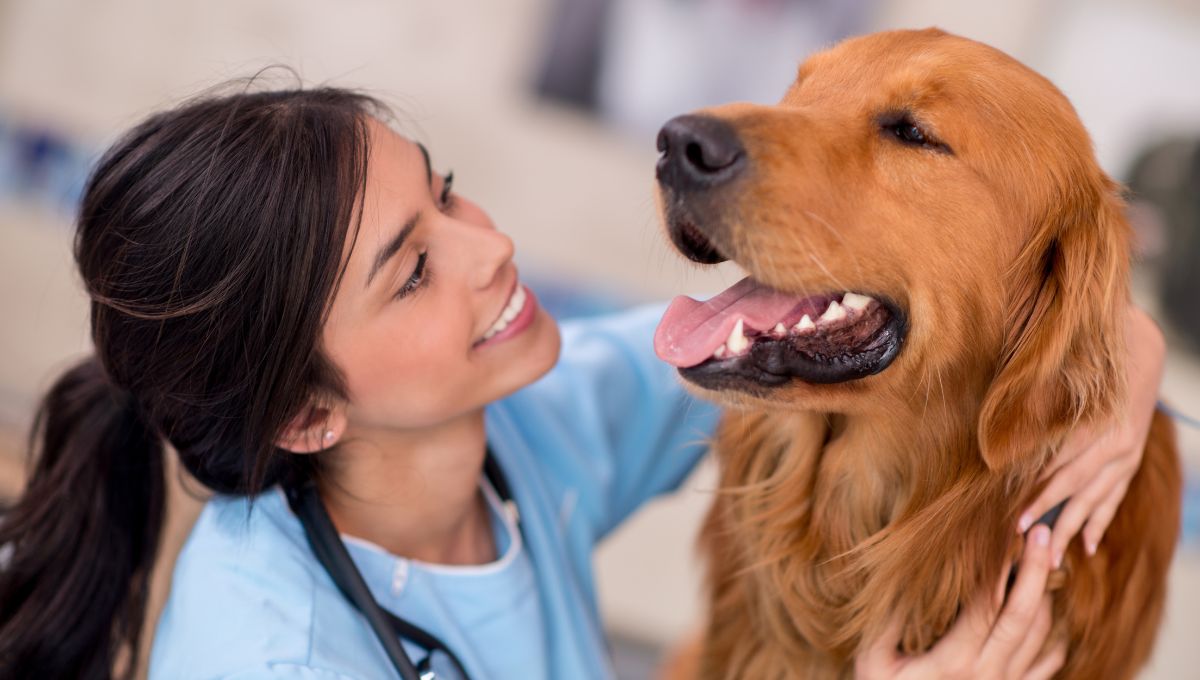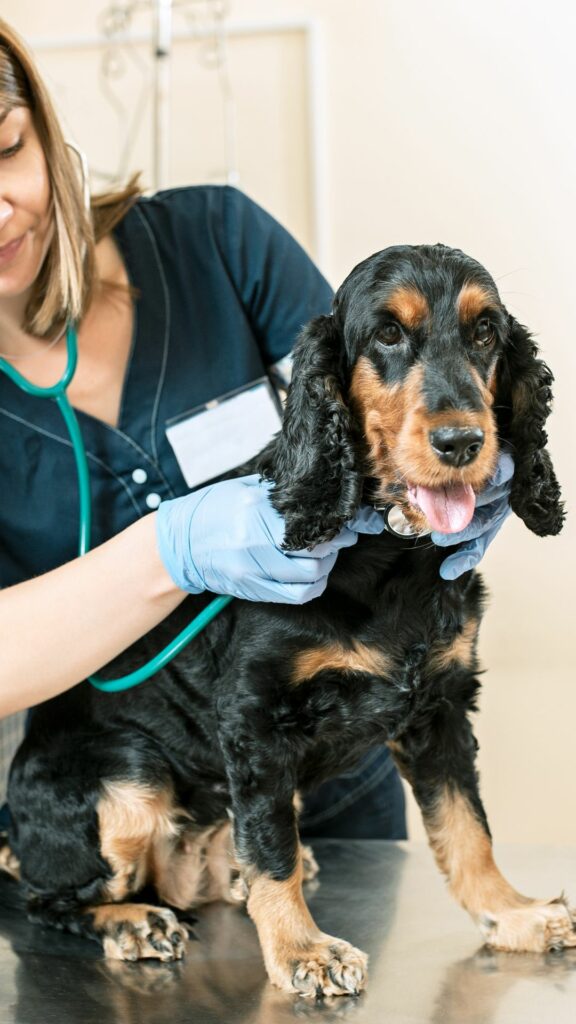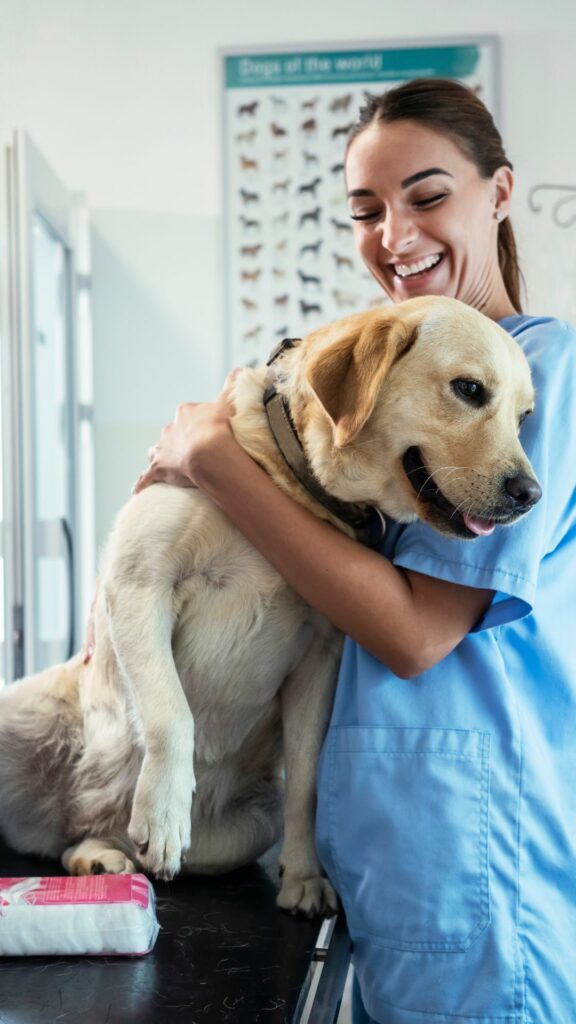Do Puppies Need 3 or 4 Sets Of Shots? What You Need To Know
Do you have a new puppy? Are you wondering how many times a puppy needs to be vaccinated, or why they need to be vaccinated multiple times?

Join us for the answers to these questions and more, as we explore the common vaccinations needed for puppies, the importance of vaccination and how often they should be vaccinated.
Suggested Article: be sure to bookmark the article, How To Take Care Of A Goldendoodle Puppy: 15 Veterinarian Tips!
The Importance of Vaccines for Puppies’ Health
Puppy vaccinations are essential because they provide protection against a range of contagious and potentially life-threatening diseases.
Puppies, just like human babies, have undeveloped immune systems, making them more susceptible to infections.
Vaccines help them develop immunity to diseases like parvovirus, distemper, hepatitis, and rabies, among others.
These diseases can cause severe suffering and, in some cases, lead to fatalities.
Vaccines are the best way to protect your puppy and the broader dog population. When a significant percentage of dogs in a community are vaccinated, it creates what is known as “herd immunity.”
This reduces the overall prevalence of contagious diseases and safeguards vulnerable puppies and dogs that may be unable to receive vaccines due to health conditions.
However, as a new pet owner, it can be overwhelming to understand the different types of vaccines and how many sets your puppy needs. Do puppies need 3 or 4 sets of shots? Less? More?
This article aims to guide you through the basics of puppy vaccinations and help you determine whether your puppy needs 3 or 4 sets of shots. Let’s start with the basics.

What Are Vaccines?
Vaccines, in simple terms, are like training tools for your puppy’s immune system. They contain tiny, harmless fragments of the disease-causing organisms (viruses or bacteria), or sometimes weakened or inactivated forms of these organisms.
These fragments are known as antigens. When your puppy receives a vaccine, these antigens stimulate their immune system without causing the actual disease.
The immune system is like a highly skilled army within your puppy’s body. When it encounters these antigens, it learns to recognize them and prepares a defense strategy.
It creates special proteins called antibodies, which can recognize and neutralize these specific antigens.
How Do Vaccines Work?
Once your pup is fully vaccinated, his immune system is now well-prepared to recognize and fight off the real disease.
Antibodies continue to be produced by the immune system for months or even years after vaccination, circulating throughout the body, ready to protect your puppy.
If the real disease is ever encountered, these antibodies are immediately available to combat it and stop the disease in its tracks. This process happens so quickly that your puppy won’t even show any symptoms of illness.
However, for a vaccine to provide the best protection possible, a series of vaccinations is required. The first set of shots helps prime the immune system and introduce it to the antigens.
Additional shots further strengthen their defense mechanisms and boost their immunity. But how many sets of shots are needed?
Do Puppies Need 3 or 4 Sets of Shots? How Puppy Vaccine Schedules Are Determined
Puppy vaccine schedules are not random. They are thoughtfully designed based on scientific research, veterinary expertise, and the specific needs of each puppy.
These schedules aim to provide early protection against diseases while allowing the puppy’s immune system to develop its own defenses.
The question of whether puppies need 3 or 4 sets of shots is one that often perplexes new pet owners.
The confusion lies in the fact that there is no one-size-fits-all vaccine strategy, and the answer differs depending on various factors, with age being the most critical factor.

Why Puppy Age Affects Vaccination Schedule
To understand the importance of age in deciding a puppy vaccine schedule, we must understand the role of passive immunity, its gradual decline, and how that impacts the timing of vaccination.
Passive Immunity and Maternal Transfer
Puppies are not born with built-in immunity to diseases, but they do acquire some shortly after birth.
This immunity comes from colostrum, the first milk produced by a mother dog. Colostrum transfers the mother’s antibodies to the pup, providing immediate, though temporary, protection against diseases the mother has encountered or been vaccinated for.
The Gradual Waning of Passive Immunity
Passive immunity, though valuable, does not last very long.
As weeks go by, the initial protection weakens until, at around 4 months of age, the maternal antibodies are pretty much gone. When this happens the puppies become more vulnerable to diseases.
Pups need to start their vaccinations well before the passive immunity disappears. If they do not receive vaccinations early enough, they may be exposed to the real disease before their own immune system is ready.
Importance of the Last Puppy Shots at 16 Weeks or Older
The 16-week mark is also incredibly important because vaccines given before this point may not be as effective as vaccines given after.
The maternal antibodies may interfere with the vaccines, making them less effective or completely ineffective.
That’s why it’s best to give them their final puppy booster shots when they’re 16 weeks old or older.
At this point, there’s a high likelihood that the maternal antibodies have sufficiently waned, and their immune system can mount a full response to the vaccine.
The Role of Early Vaccination in the Debate
Now, let’s circle back to the debate between 3 sets and 4 sets of shots. The age at which a puppy receives their first vaccination is also important to this decision.
Puppies that start their vaccine series at a younger age may require more sets of shots than puppies that start when they are older.
This is because their initial vaccines are given during a period when passive immunity is still relatively strong.
The maternal antibodies the pups get from the colostrum essentially “neutralize” the vaccines, preventing them from eliciting a full immune response.
By starting vaccinations early, there’s a higher chance that the puppy will need additional sets to overcome this interference and establish their own immunity effectively.
This doesn’t mean that those early vaccines are useless. On the contrary, they play an essential role in priming the immune system and providing some protection to the puppy.
The point of vaccinating the pup several times before they are 16 weeks old is to make sure we hit the sweet spot where their immunity is mature enough to mount a proper defense and not too late that their passive immunity has significantly weakened.

5 Reasons Why Puppies May Need 4 Sets of Shots Instead of 3
As a veterinarian, my standard recommendation is that all pups (and kittens!) get a minimum of 3 sets of core vaccines, with their first round of vaccinations starting at 8 weeks of age.
The second set of puppy vaccines (booster vaccinations) will be at 12 weeks, and the third set of shots in the puppy series will be at 16 weeks of age.
They will also get their first rabies vaccination at 16 weeks.
However, there are some situations or risk factors where I recommend that puppies get 4 sets of shots:
- Maternal Antibodies: As discussed earlier, maternal antibodies passed from the mother to the puppy can interfere with vaccine efficacy, and the younger the pup the more likely this is to happen. If pups are first vaccinated at 6 weeks of age, then their next vaccines should be at around 8 to 10, 12 to 14, and 16 to 18 weeks of age.
- Breed Susceptibility: Certain dog breeds are more susceptible to particular diseases. For example, breeds like Doberman Pinschers, Rottweilers, and English Springer Spaniels have a higher susceptibility to parvovirus. These breeds may benefit from extra sets of shots to bolster their immunity against this highly contagious disease.
- High-Risk Environments: Puppies in high-risk environments, such as those with a history of disease outbreaks or exposure to other animals, may face increased chances of contracting diseases. Puppies that are in high-risk environments like shelters or other facilities housing dogs from multiple sources are often given an additional set of shots for extra protection.
- Lifestyle Factors: A puppy’s lifestyle can also influence the need for extra vaccinations. Puppies that frequent dog parks, attend training classes, or participate in dog shows may encounter more infectious diseases. Additional vaccinations can be a prudent choice for these active pups.
- Regional Disease Prevalence: The prevalence of certain diseases can vary by region. Puppies living in areas with a higher incidence of specific diseases may require extra vaccinations tailored to the local disease risks.
Ultimately, the decision regarding three sets or four sets of shots should be made in consultation with your veterinarian.
Your vet can assess a puppy’s unique circumstances, taking into account their age, breed, health, and environment.
Their expertise ensures that your puppy’s vaccination schedule is the best one for them based on their individual needs.
When Do Dogs Only Need 2 Sets of Shots?
A different schedule comes into play for puppies who receive their first vaccine after the crucial 16-week mark.
The vaccine schedule for dogs in this category is much simpler. In these cases, the first shots (including the rabies vaccine) are administered after 16 weeks of age.
This initial shot kickstarts the dog’s immune system, as maternal antibodies have significantly waned by this stage.
Then, a booster vaccine is given approximately 2-4 weeks after the first shot. This follow-up strengthens the puppy’s immune response and solidifies protection against common diseases.
Puppy Vaccination Schedule: Which Vaccines Do Puppies Need?
Now, let’s get into the specifics of puppy vaccinations. The vaccine schedule for puppies typically includes a combination of core and non-core vaccines.
Core vaccines are those that protect against the most common and severe diseases, such as rabies, canine distemper virus, canine parvovirus, and canine adenovirus. These are highly recommended for all puppies.
Non-core vaccinations protect against less prevalent or mild diseases, such as Lyme disease or kennel cough. These may be recommended based on your puppy’s risk of exposure, such as Bordetella (kennel cough) for puppies who visit dog parks or go to boarding facilities or canine influenza virus in regions where this virus is known to be circulating.
The following tables are the vaccine schedules recommended by the American Animal Hospital Association.

Core Vaccine Schedule For Dogs
Core vaccines are recommended for all dogs irrespective of lifestyle unless there is a specific medical reason not to vaccinate:
| ANTIGEN | INITIAL VACCINATION | REVACCINATION | |
| Dogs ≤16 Weeks of Age | Dogs >16 Weeks of Age | ||
| Distemper Adenovirus Parvovirus +/-Parainfluenza | At least 3 doses of a combination vaccine between 6 and 16 weeks, 2-4 weeks apart. | 2 doses of a combination vaccine, 2-4 weeks apart. | A single dose of a combination vaccine within 1 year following the last dose in the initial vaccination series. Administer subsequent boosters at intervals of 3 years. |
| Rabies | As required by local laws in your region | ||
Non-Core Vaccine Schedule For Dogs
Non-core vaccines are recommended for some dogs based on lifestyle, geographic location, and risk of exposure:
| ANTIGEN | INITIAL VACCINATION | REVACCINATION | |
| Dogs ≤16 Weeks of Age | Dogs >16 Weeks of Age | ||
| Leptospira (killed) 4-serovar | Two doses, 2-4 weeks apart, starting at 12 weeks of age. | Two doses, 2-4 weeks apart, regardless of dog’s age. | A single dose within 1 year following the last dose in the initial vaccination series. Administer subsequent boosters annually. |
| Borrelia burgdorferi (canine Lyme disease) | Two doses, 2-4 weeks apart. | Two doses, 2-4 weeks apart, regardless of dog’s age. | A single dose within 1 year following the last dose in the initial vaccination series. Administer subsequent boosters annually. |
| Bordetella bronchiseptica & canine parainfluenza virus | A single (IN) dose is indicated for dogs at risk of exposure. | Administer subsequent boosters annually. | |
| Bordetella bronchiseptica only | Parenteral (SQ): Two doses, 2-4 weeks apart. IN: Administer a single dose intranasally. Oral: Administer a single dose into the buccal pouch. | Administer subsequent boosters annually. | |
| Canine influenza virus-H3N8/H3N2 | Two doses, 2-4 weeks apart. | A single dose within 1 year following the last dose in the initial vaccination series. Administer subsequent boosters annually. | |
| Crotalus atrox (Western diamondback rattlesnake) | Dosing requirements and frequency of administration vary among dogs depending on body weight and exposure risk. | ||
Dogs With Overdue or Unknown Vaccination History
| Core and Noncore Vaccines | The benefits of vaccination far outweigh the risks in cases of dogs with unknown immune status or vaccination history. In cases of overdue vaccinations, consult specific vaccine manufacturers for instructions. A good rule of thumb is: When in doubt, vaccinate. | ||
| Rabies | Follow local laws and consult the state veterinarian as needed. | ||
Summing Up
In the debate over whether puppies need 3 or 4 sets of shots, the answer becomes clear: it depends.
The number of sets is a dynamic factor influenced by various elements, including age, breed, environment, and lifestyle. Each puppy is as unique as its pawprint, and so are its vaccination needs.
What remains undeniable is the unwavering commitment to protecting our four-legged friends from preventable diseases. Whether it’s through three sets or four, the ultimate goal is the same: ensuring that puppies grow into healthy, happy dogs.
In the end, what matters most is providing puppies with the best start in life, setting them on a path to a future filled with bounding joy and endless tail wags.

Sources: